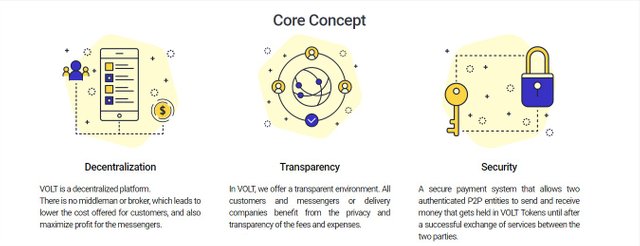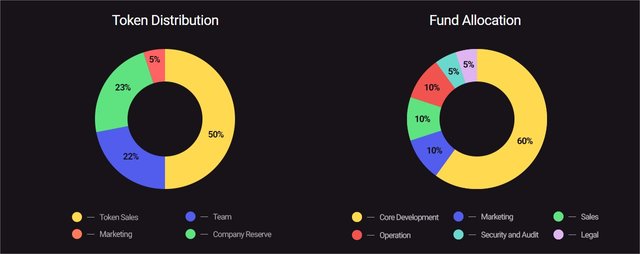VOLT, P2P Delivery Platform based on Blockchain

Do you know that the delivery service market has expanded dramatically around the world and it is estimated to grow even further in economic significance? A third-party delivery business can help you attract new customers and increase your profits by giving people easy access to your food. These businesses allow you to implement a delivery system in an affordable way. However, disruption is coming to the industry in the form of blockchain technology, which promises to deliver a cheaper and more efficient system of managing logistics. Innovative startups, as well as major incumbent parties, are investing enormous amounts of time and resources in blockchain development. the existing delivery service market's vague price estimation, delivery speed limitation, insufficient quality and the inconvenient interface has created major pitfalls. The delivery service market is dramatically increasing worldwide. The online shopping market expands more than 20% annually, and its expansion is directly correlated with the delivery service market. Even the food delivery service market has recently increased dramatically worldwide, causing a correlated increase in the delivery service market, as well. Both online shopping and food delivery critically require an efficient, reliable and speedy delivery system.
In order to solve these problems, project VOLTwas developed. VOLT is based on blockchain technology and, combined with smart contracts, will eliminate the dependence on the centralized system between the participants, significantly reducing the price of deliveries for customers. On the other side of the spectrum, the messengers and delivery companies will have higher income in-hand. Not only does VOLTguarantee messengers get a higher-income, bolt eliminates the time and technical constraints to allow anyone and everyone to use the system. This subsequently enables a larger pool of messengers, including retirees, part-timers, or those who want a second job to be actively involved. In addition, the order matching system can be further facilitated by messengers setting up a delivery radius according to the preferred means of transport on.VOLT's core business leverages Big Data technology. VOLT's utilization of Big Data to automate the system ensures a more user-friendly service. Imagine a world that allows you to send confidential documents or contracts to the investors with just a few touches. VOLT's innovative delivery-request system will open a new paradigm, introducing another era of convenience.

TOKEN FLOW
VOLT’s business model is to connect customers with messengers. The company strives to provide a convenient and user-friendly service with customized algorithms and a smart contract-derived matching system using Big Data. For the customers to use this service, VOLT Coin is required. When delivering items, the value of the delivery service is determined according to the distance, time window and weight of the item. For example, a customer requires 600 Jula for item A to be delivered to a destination 2km away (Jula being VOLT’s term for a unit of work), where as it may cost 1200 Jula for the same item A to be sent to a destination 6km away. VOLT is developing an optimal algorithm to calculate the price and is also aiming to introduce an auction system for special delivery requests. The use of VOLT Coins is required for the customer to submit the delivery request. To determine the amount of ‘work’ required for each delivery, we must take into account a number of variables such as the time of delivery, the shipping distance, the time required and the weight of the shipment. Combined, we call this unit of work “Jula”. The Jula to VOLT Coin ratio is not necessarily fixed, and may change according to the price in the market - but the ratio of the first Jula to VOLTCoin starts at 1:1.

A customer who requires the service can purchase the coins from the Exchange. A customer will purchase 100 coins for a delivery service that costs 100 coins. The customer will pay 100 coins to VOLT then VOLT corresponds the request to the messenger. Aer the service is completed, VOLT transfers 95 coins to the messenger. Approximately 5% of the coin is used as a commission to the company profit. The percentage of commission is subject to vary and is not constant. The company sells the coin earned to the Exchange to produce revenue. The revenue is used to maintain the company or provide dividends to the VOLT shareholders, but not to the coin-holders. If this process goes through a cycle, the coin demand will eventually be higher than the supply from the Exchange, resulting in an increase in value for the coins. A combination of algorithms and current coin price will be used by VOLT to adjust the coin/Jula rate. In the long term, the coin/Jula rate will increase and one will be able to purchase more Jula for 1 VOLT Coin. This will consequently also increase the value of Jula.

Blockchain technology is looking to replace a large number of existing technologies and the fastest market in which the existing technology is being replaced by Blockchain is the Logistics sector. The reason behind this is that the existing delivery market operated through the cooperation of delivery companies that lack transparency. This non-transparency has limited the partnership between messengers, increased the overall price, and has slowed down the delivery. To tackle these problems, Blockchain technology has provided a method to secure transparency without infringing on the anonymity of the customers and messengers. This enables the customer to track the package without any difficulty, whether a single package is delivered byP2P, multiple messengers, or through a delivering party. In addition, Blockchain ensures the messengers and delivering party has to access the order information without special permission, while in a secure environment. VOLT's 2 core technologies are AI and Blockchain technology. In order to share the benefits with both the customers and messengers, it is necessary to minimize human intervention and replace it with AI technology. In addition, to verify that there are no anomalies in the processes, Blockchain technology must be employed. The reason behind blockchain technology gaining steam in the 21st century is not only because of its technological superiority but of its decentralization and distribution of the powers and rights in a highly centralized society. The developers of early cryptocurrency had focused on these features of the blockchain, but multiple projects are now moving to focus on the profitability and funding. VOLT's model will minimize the intervention of middleman by employing AI and will verify the processes through distributed authority and transparency. VOLT aims to create a truly decentralized economy.
For more information you can check :
Website : https://volttech.io/
Whitepapper : https://volttech.io/public/Final%20VOLT%20White%20paper%200410.pdf
Facebook : https://www.facebook.com/VoltTechnology1
Twitter : https://twitter.com/Volt_Technology
LinkedIn : https://www.linkedin.com/company/volttech/
Vote exchange site https://mysteemup.club